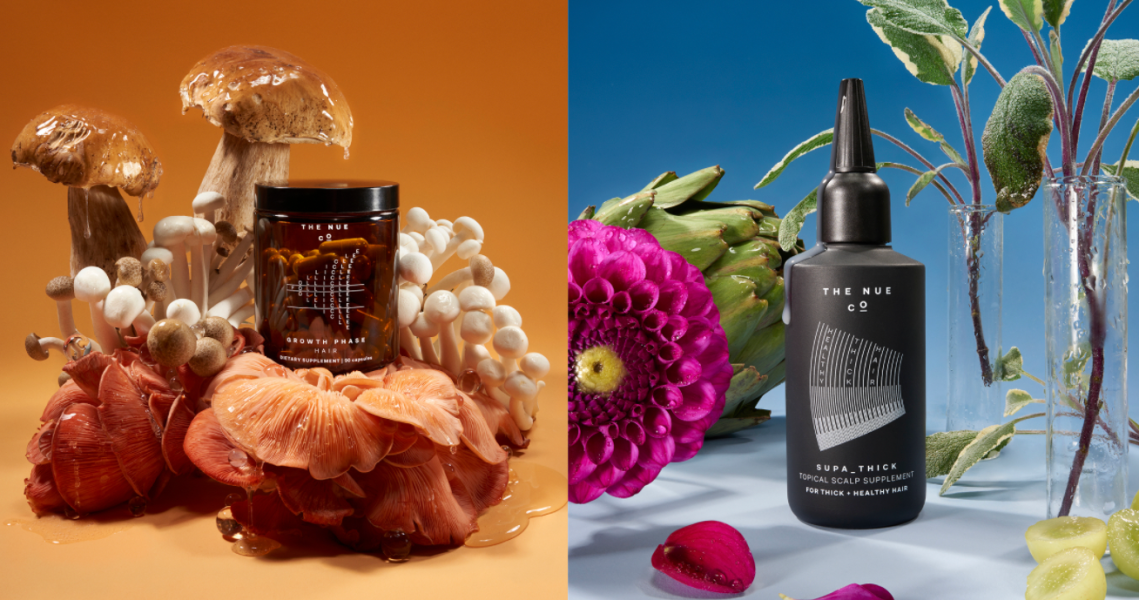There has been a new focus on hair, since Covid took hold of the states in March 2020. Some consumers reported hair loss, spiked by Covid or the stress of a pandemic. Plus, many people braved attempts at cut and color DIYs, amid a lack of access to salon services. All this led to a proliferation of new products and also moments of success for brands like Nutrafol that were already in the space. In the past year, Sephora introduced hair-focused brands including Vegamour, which sells gummy supplements for hair growth, as well as shampoo and conditioner.
The latest brand to join the conversation is The Nue Co, known for products like its Pre/Probiotic, its functional fragrances and its Skin Filter supplements, which claim to provide an ingestible alternative to retinol. The brand first launched in Sephora in August, demonstrating the continually blurry line between beauty and health products.
As Glossy previously reported, the brand secured a $25 million Series B round in July. In September, around the Sephora launch, 80% of the brand’s sales were via DTC e-commerce and driven primarily by subscriptions. At the time, Miller said the company aimed to bring wholesale and DTC closer to an even split over the next 3-4 years. The Nue Co. sells through Net-a-Porter, Nordstrom and Credo Beauty, among other retailers.
The Nue Co is entering the hair space in multiple formats, including an oral supplement called Growth Phase and a topical pre-wash product called Supa Thick. The two products will be exclusive to Sephora for a month after their launch, on Tuesday.
Jules Miller, founder of The Nue Co, said the brand had begun to work on its hair products prior to Covid. As hair-care has been a fast-growing category for Sephora, according to Miller, timing for the rollout made sense for both companies.
Though there are many products on the hair market, ranging from colorful gummies to nicely-packaged minoxidil (a dermatologist favorite ingredient for addressing hair loss), Miller said the goal for The Nue Co is to address a middle ground for customers where she saw a white space.
“On one end of the spectrum, you have traditional hair gummies. And they speak to one contributing factor of hair loss, which is usually nutrient deficiencies. They’re usually cheaper. Then, on the other end of the spectrum, you’ve got people who are losing their hair. They’ve got alopecia, they’ve got bald patches. They’re going to the doctor because they need professional help from a dermatologist. This is between the two. It’s for the women who are shedding more hair than they usually do. Statistically, that’s one in three of us.” Miller said.
She wanted to create products that could both reduce hair loss and increase hair growth, and a “topical and ingestible working together was the only way to do that,” she said.
Growth Phase comes with a month’s supply of supplements (three per day) for $65. In clinical studies, it demonstrated a 40% improvement in hair growth and 87% reduction in hair shedding over the course of 20 weeks, according to the company. The hero ingredient is Biovabio, one of the brand’s few non-vegan ingredients. The patented ingredient comes from “the film on the inside of an eggshell,” Miller said, adding that the brand only uses non-vegan ingredients if “there’s a really good reason.”
“It’s the purest and least-processed delivery of collagen, hyaluronic acid and keratin, and is clinically proven to speed up hair growth and protect the hair follicle,” she said.
The product also features horsetail, kelp, reishi and rhodiola, in keeping with the brand’s usual mix of clinical ingredients and Eastern or Ayurvedic ones.
Supa Thick, $45 for 4 ounces, features Redensyl, another patented ingredient that Miller said has been shown to increase hair growth and decrease hair loss. Other ingredients include probiotics and postbiotics, in the form of gently exfoliating lactic acid. It also features amla and essential oils like peppermint, clary sage and rosemary.
“We always look at the topical microbiome, and we’re really thinking about the scalp as [part of] your skin barrier,” Miller said, a notion in keeping with the continued explosion of the “skinification” of the scalp. “Hair care could really be the new skin care. We all went beauty mad [during the pandemic], and we’re definitely in that place of thinking about health. When you think about looking healthy, your skin and your hair really play into that.”
When The Nue Co told Sephora about these launches, Sephora was immediately interested in launching them exclusively, Miller said. Sephora could not comment on this story. “The customer is becoming more familiar and more comfortable with thinking about how they resolve their beauty concerns. [They’re more open to] ingestibles.”




